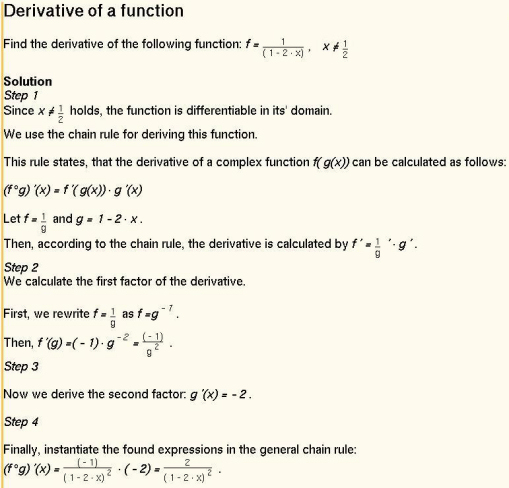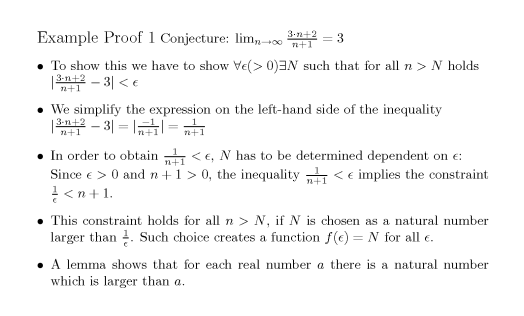|
We are seeking help for establishing an empirical basis for the
generation of 'faded examples'. 'Faded examples' are worked-out
problem solutions/proofs in which certain parts are removed. We
implemented a configurable fading process. The following
questionnaire is an attempt to receive input for modeling 'rules' on
what to fade when.
Therefore, we provide you with screenshots of a worked-out proof
example and a solution for computing a derivative of a composite
function encoded in ActiveMath (www.activemath.org)
for which we ask you to answer several questions.


|
0. would you rather change this worked-out solution/proof? If yes, how?
e.g. we could introduce a Polya/Boero framework into the example... |
|
|
1. which parts would you fade and why? (what would be the (learning) goal of that
fading, focusing students on typical errors?) |
|
For those faded examples:
|
1a. how difficult would be each of the produced faded examples?
|
|
|
1b. how can one prevent students to misuse such faded examples
(e.g. doing puzzle solving rather than proving)
|
|
|
1c. would you rather choose another example/proof for fading or for introducing
errors?
If yes, please provide us with that example.
|
|
Moreover, we would like to know from you:
|
2. would you rather make the fading adaptively? and what would this adaptivity
be like
(e.g. dependent on abilities of student, of context, of learning progress)?
|
|
|
3. which feedback would you like to provide to the student in case he/she has
problems
to fill the faded parts?
|
|
For another line of research - productive usage of erroneous examples -
we would also like to know:
|
4. which errors would you introduce into these examples (and why?) to provide
students
with an erroneous proof in which they have to find and correct the errors?
|
|
|
5. which hints and help would you provide to students who cannot find/correct
the errors?
|
|
By pressing the submit button below, your answers will be sent to me by mail.
In turn we would be happy to provide you with our experience and results! We
have several erroneous and faded examples available on web pages for our
students already... (we need you response before looking at them though, and
maybe after again ;-) )
Many thanks for your cooperation!
ERICA
Dr. Erica Melis
German Research Institute for Artificial Intelligence
Daarbrücken, Germany
Tel: +49 681 302 4629
|
Please give your name and/or mail address.
|
|
|